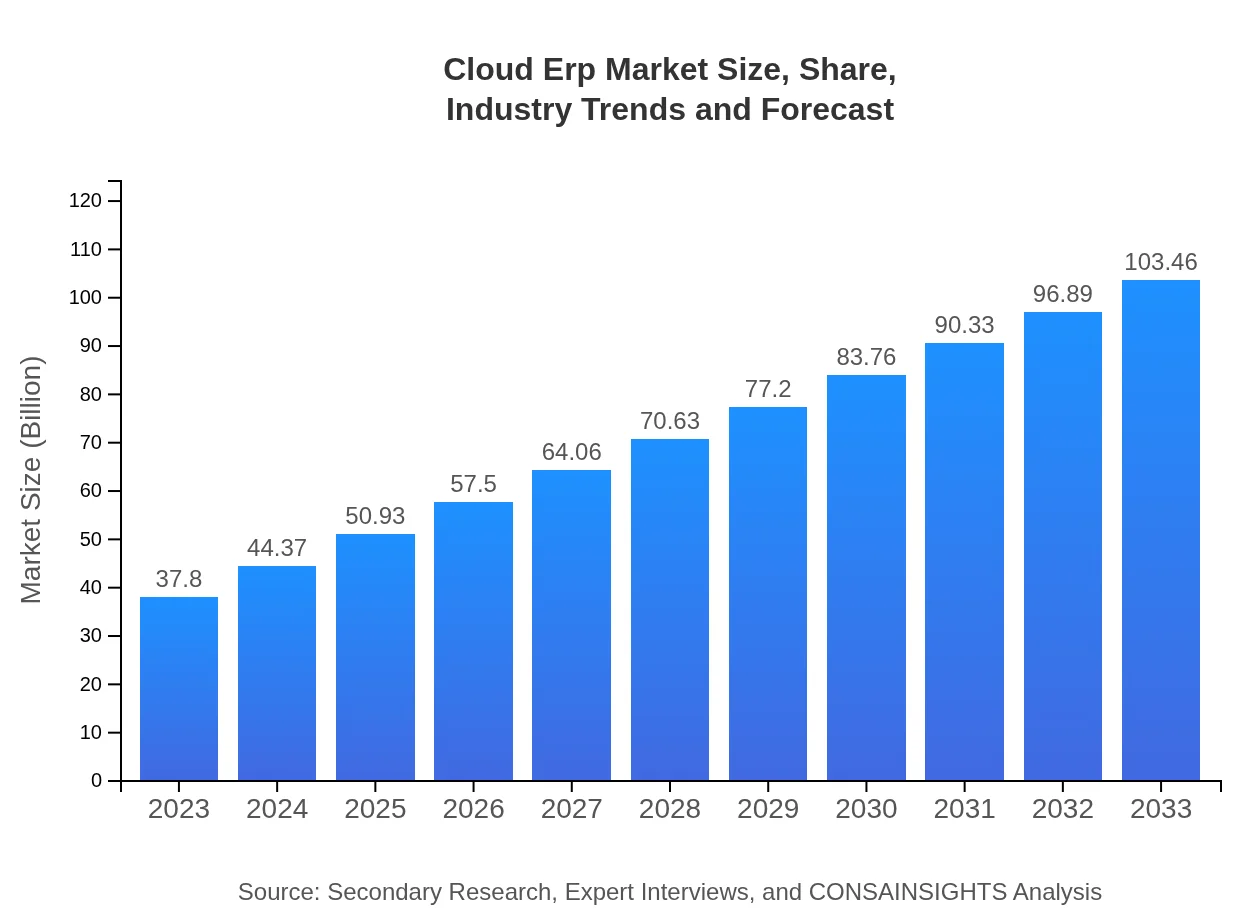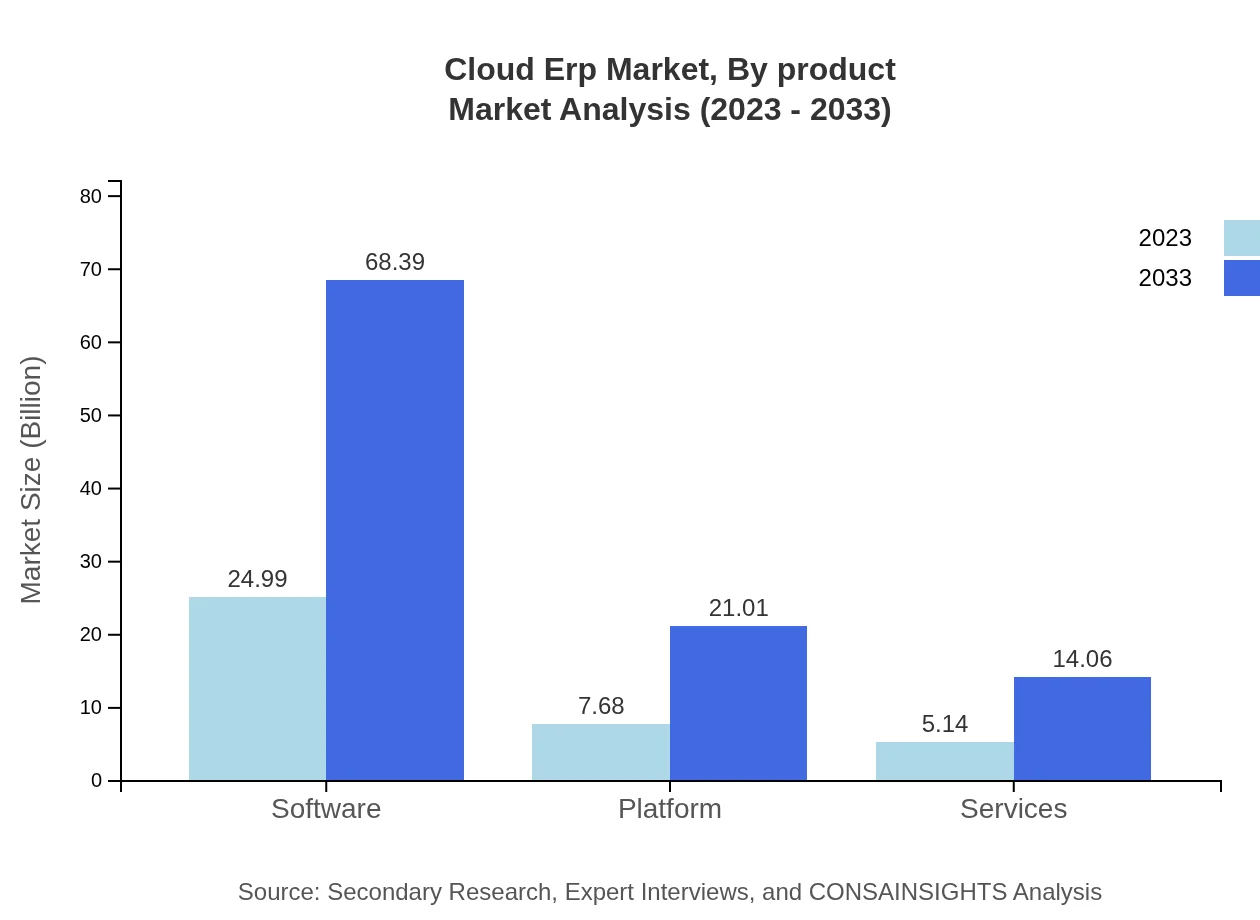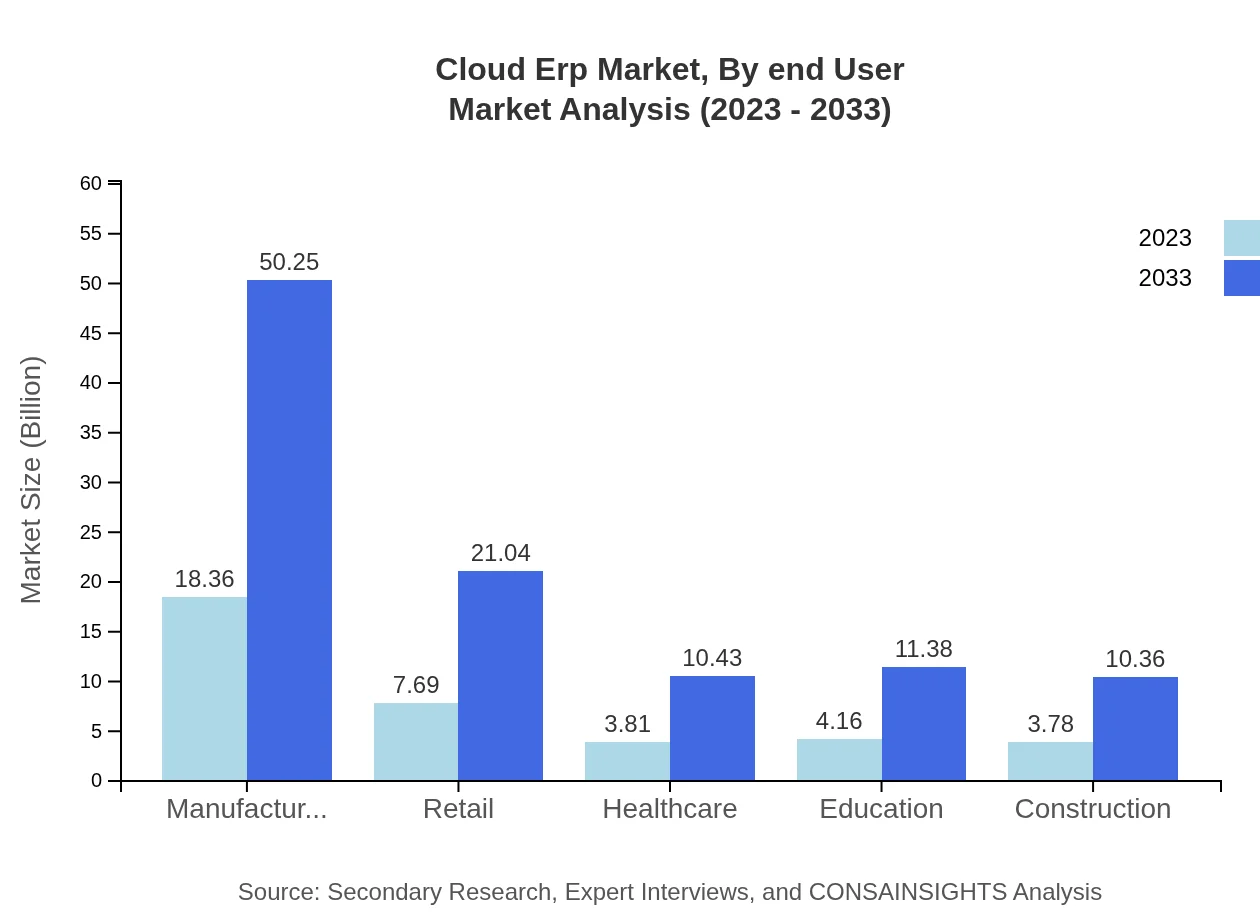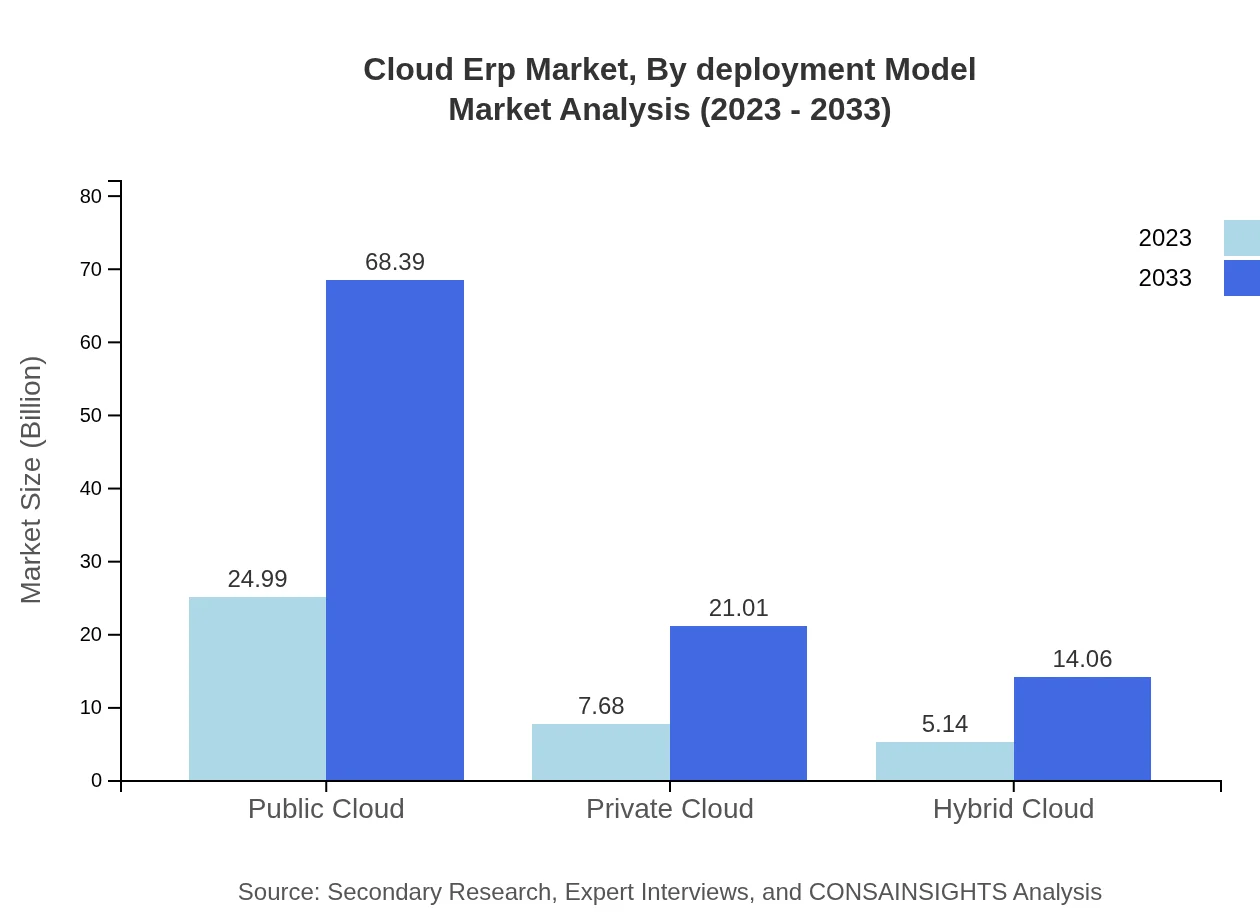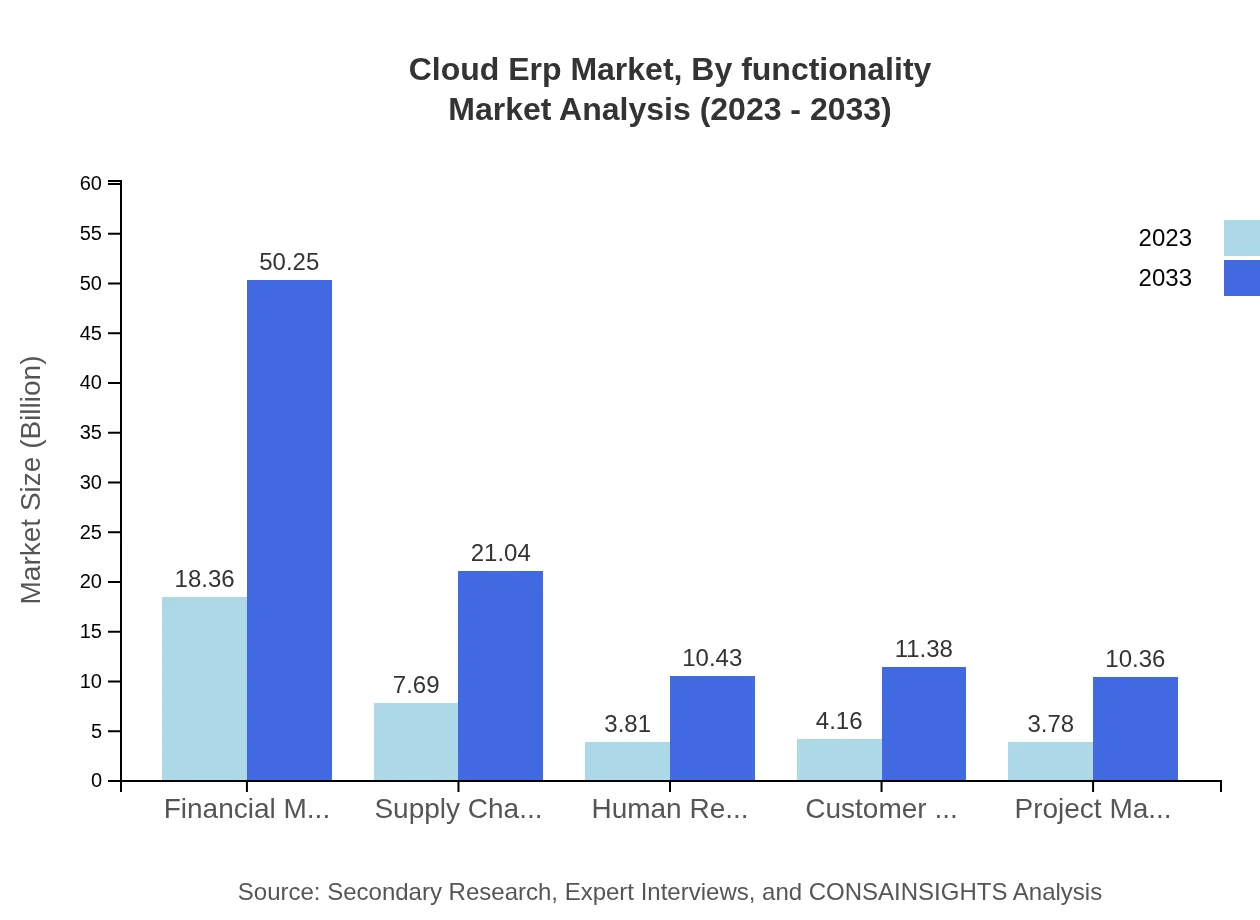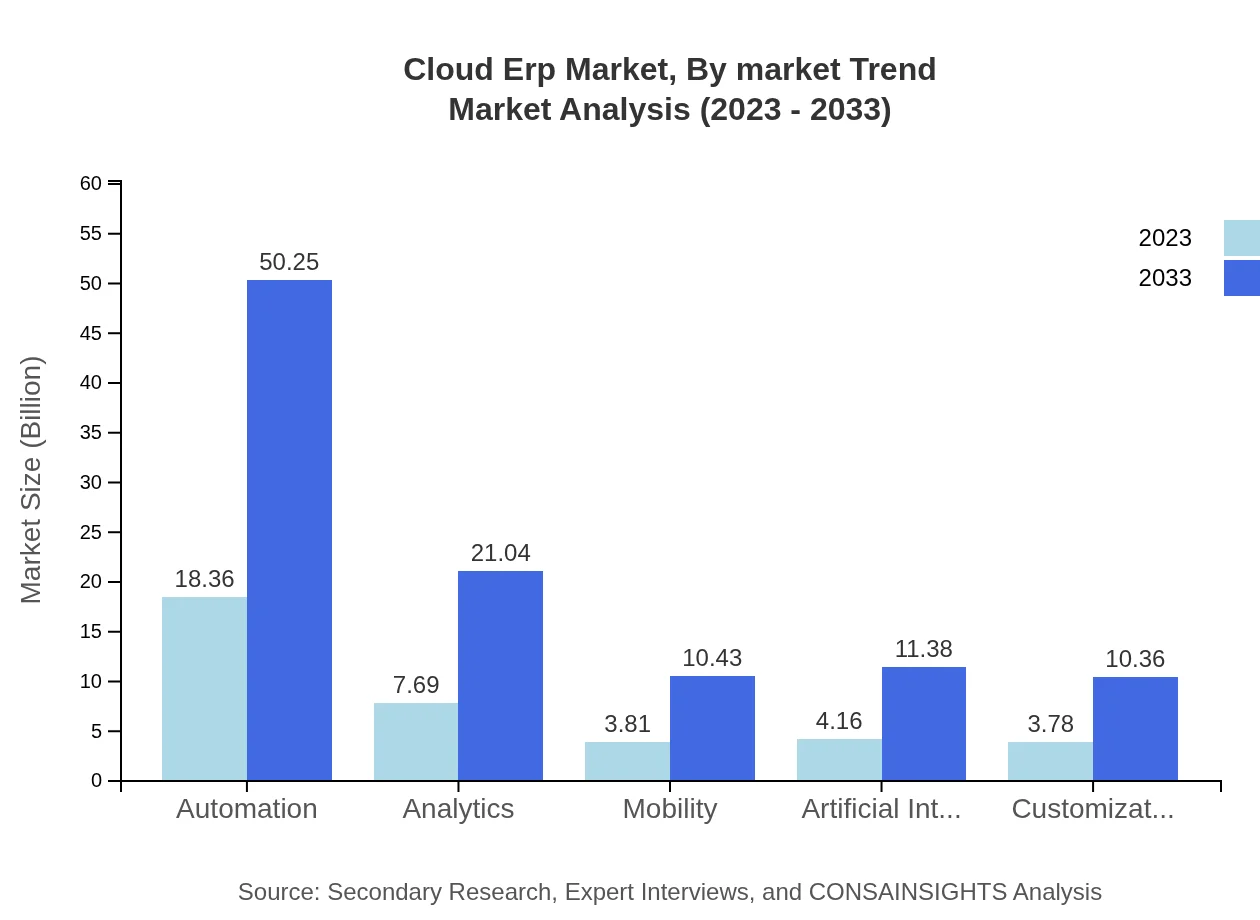Cloud Erp Market Report
Published Date: 31 January 2026 | Report Code: cloud-erp
Cloud Erp Market Size, Share, Industry Trends and Forecast to 2033
This report provides an in-depth analysis of the Cloud ERP market from 2023 to 2033, detailing market size, growth trends, regional insights, industry analysis, and forecasts. The insights and data herein offer valuable perspectives for stakeholders in this rapidly evolving sector.
| Metric | Value |
|---|---|
| Study Period | 2023 - 2033 |
| 2023 Market Size | $37.80 Billion |
| CAGR (2023-2033) | 10.2% |
| 2033 Market Size | $103.46 Billion |
| Top Companies | Oracle Corporation, SAP SE, Microsoft Dynamics, Infor CloudSuite, NetSuite |
| Last Modified Date | 31 January 2026 |
Cloud Erp Market Overview
Customize Cloud Erp Market Report market research report
- ✔ Get in-depth analysis of Cloud Erp market size, growth, and forecasts.
- ✔ Understand Cloud Erp's regional dynamics and industry-specific trends.
- ✔ Identify potential applications, end-user demand, and growth segments in Cloud Erp
What is the Market Size & CAGR of Cloud Erp market in 2023 and 2033?
Cloud Erp Industry Analysis
Cloud Erp Market Segmentation and Scope
Tell us your focus area and get a customized research report.
Cloud Erp Market Analysis Report by Region
Europe Cloud Erp Market Report:
Europe’s Cloud ERP market will see an increase from $11.46 billion in 2023 to $31.38 billion by 2033, supported by stringent regulatory requirements and the push for digital transformation in response to competitive pressures across European nations.Asia Pacific Cloud Erp Market Report:
The Asia Pacific region is expected to exhibit robust growth, expanding from a market size of $7.30 billion in 2023 to $19.99 billion by 2033, primarily driven by the digital transformation initiatives in countries like China and India. Increasing adoption of cloud solutions among SMEs and the expansion of manufacturing sectors further bolster growth.North America Cloud Erp Market Report:
North America leads the Cloud ERP market, showcasing significant growth from $12.82 billion in 2023 to $35.08 billion by 2033. The high concentration of major ERP vendors and the early adoption of cloud technologies across various industries contribute to this region's dominance.South America Cloud Erp Market Report:
In South America, the Cloud ERP market is projected to grow from $1.71 billion in 2023 to $4.69 billion by 2033. Factors such as increasing internet penetration and the need for operational efficiency in both large and small enterprises are fueling adoption.Middle East & Africa Cloud Erp Market Report:
The Middle East and Africa are expected to expand from $4.50 billion in 2023 to $12.32 billion by 2033. Growing investments in IT infrastructure and an increasing understanding of the benefits of cloud solutions among organizations are key factors driving market growth.Tell us your focus area and get a customized research report.
Cloud Erp Market Analysis By Product
The Cloud ERP market is predominantly driven by Software solutions, which will encompass approximately $24.99 billion in 2023 and grow to $68.39 billion by 2033, representing significant adoption due to the required functionalities and ease of use. Other segments include Platforms and Services, vital for offering comprehensive ERP solutions.
Cloud Erp Market Analysis By End User
Manufacturing continues to be the largest segment in the end-user category, anticipated to grow from $18.36 billion in 2023 to $50.25 billion by 2033, optimizing production and supply chains. Retail, Healthcare, and Education sectors follow closely, indicating a varied demand across industries.
Cloud Erp Market Analysis By Deployment Model
Public Clouds are leading, currently holding $24.99 billion market size in 2023 and expected to surge to $68.39 billion by 2033, due to flexibility and cost-effectiveness. Private and Hybrid Cloud deployments show significant growth as security and compliance become paramount for organizations.
Cloud Erp Market Analysis By Functionality
Functionality-wise, Financial Management holds a substantial share, expected to grow from $18.36 billion in 2023 to $50.25 billion in 2033. HRM and SCM functionalities are also crucial in enhancing organizational capabilities across sectors.
Cloud Erp Market Analysis By Market Trend
Current trends show a shift towards AI-driven analytics, mobility solutions, and increased customization options. The focus on user-friendly interfaces and seamless integrations with existing applications is expected to shape the future of Cloud ERP systems.
Cloud Erp Market Trends and Future Forecast
Tell us your focus area and get a customized research report.
Global Market Leaders and Top Companies in Cloud Erp Industry
Oracle Corporation:
A leading provider of enterprise software solutions, Oracle offers a comprehensive suite of Cloud ERP applications that enable businesses to streamline their operations and gain insights through advanced analytics.SAP SE:
With deep expertise in enterprise software, SAP’s Cloud ERP solutions enhance performance across sectors, improving efficiency while integrating essential business functions into a single platform.Microsoft Dynamics:
Microsoft's suite of cloud ERP solutions is designed for SMEs, offering customizable options that align with business needs and drive digital transformation across various industries.Infor CloudSuite:
Infor specializes in industry-specific cloud ERP solutions that deliver operational performance and enhance data visibility, supporting specialized needs in sectors like manufacturing and healthcare.NetSuite:
A robust cloud-based ERP solution provider, NetSuite is renowned for its efficiency in financial management and scalability, making it ideal for rapidly growing organizations.We're grateful to work with incredible clients.









FAQs
What is the market size of Cloud ERP?
The global Cloud ERP market is valued at approximately $37.8 billion in 2023 and is projected to grow at a CAGR of 10.2%, potentially reaching significant market size by 2033.
What are the key market players or companies in the Cloud ERP industry?
The Cloud ERP industry is dominated by key players such as SAP, Oracle, Microsoft, Infor, and Salesforce. These companies lead through innovation, extensive product offerings, and strong customer bases.
What are the primary factors driving the growth in the Cloud ERP industry?
Key factors driving Cloud ERP growth include increasing demand for scalability, flexibility in business operations, cost-effectiveness, and enhanced data accessibility. Additionally, the rise of remote working and digital transformation initiatives foster cloud adoption.
Which region is the fastest Growing in the Cloud ERP market?
Among global regions, North America is currently the largest market, projected to expand from $12.82 billion in 2023 to $35.08 billion by 2033. Europe follows closely, with growth from $11.46 billion to $31.38 billion.
Does ConsaInsights provide customized market report data for the Cloud ERP industry?
Yes, ConsaInsights offers customized market report data tailored to specific needs within the Cloud ERP industry, providing in-depth insights that align with client requirements for more precise decision-making.
What deliverables can I expect from this Cloud ERP market research project?
Deliverables from the Cloud ERP market research project include comprehensive reports, detailed market analysis, regional insights, competitive landscape assessments, and forecasts across various segments and market dynamics.
What are the market trends of Cloud ERP?
Current Cloud ERP trends include increased adoption of AI and machine learning, a shift towards mobile accessibility and customization, growing cloud segmentation, and a significant focus on automation and analytics for enhanced operational efficiency.

